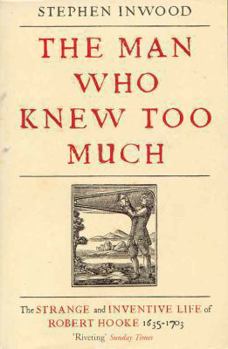Man Who Knew Too Much (PB)
Select Format
Select Condition 
Book Overview
In Inwood's biography of this forgotten scientist, Robert Hooke and his world are vividly recreated with all their contradictions, successes, and failures. The Forgotten Genius is an absorbing and... This description may be from another edition of this product.
Format:Paperback
Language:English
ISBN:0330488295
ISBN13:9780330488297
Release Date:January 2003
Publisher:Pan MacMillan
Length:512 Pages
Weight:0.30 lbs.
Customer Reviews
3 ratings
Evocative History of Science
Published by Thriftbooks.com User , 17 years ago
A thoroughly readable and enjoyable book about the intellectual colleague and contemporary of Christopher Wren and Isaac Newton in 17th century London. The writing is witty and engaging and provides a vivid look at the social, scientific and physical structure of London after the Great Fire. I especially enjoyed the author's humorous descriptions of the machinations behind the scenes of the Royal Society and the often dangerous and bizarre experiments that Hooke and others would perform for the Society. A great peep into the development of many engineering, physics, astronomical chemistry and architectural discoveries.
A biography well worth your time
Published by Thriftbooks.com User , 18 years ago
This book provides a great deal of information about Robert Hooke not only as a contributor to modern science, but as a person during his lifetime. The issue of Newton being an antagonistic force in Hooke's life is emphasized greatly, and helps the reader understand how much power Hooke had to exert in order to make his ideas and discoveries known. The book is enjoyable due to the fact that it does not solely focus on the science related aspect of Hooke's career. Having known little about him before I opened the book, I was surprised to find that he had a great deal of influence on structural architecture during the seventeenth century. The book provided me with a substantial amount of knowledge regarding Hooke's inventions and discoveries, as well as his personal feelings and reactions to certain people or occurrences, through the many quotations of his present throughout the reading. This book is a fantastic source for one who is interested in learning about every aspect of Hooke's life, from the contributions to science as a general subject to his contributions to architecture and his involvement in technology during his time period. Not only was I able to gain a better understanding of the scientist and inventor within Hooke, but I was also able to understand him as a person and his life as well.
The Man Who Knew Too Much
Published by Thriftbooks.com User , 20 years ago
As a physics teacher, I had been well aware of Robert Hooke. Every year I teach Hooke's Law of elasticity to my students. Additionally, I had been aware of the importance of his book Micrographia and, since I consider myself a bit of a student on Isaac Newton, I had known something of his conflict with Newton over the Principia. However, I admit my knowledge of Hooke was sketchy. As a student of scientific history, I wanted that rectified so I turned to this book. It was certainly a rewarding experience. Without a doubt, I learned much more than I ever knew about Robert Hooke and I gained a new respect for the man. Hooke's areas of interest were wide and his curiosity unbounded. I was completely unaware of his work with Christopher Wren and his own contributions to architecture and the reconstruction of London after the Great Fire. Additionally, I came to admire his willingness to stand behind the virtues of science (as in his prescient speculations on evolution) in the face of religious prejudice. And, apart from learning about Hooke, this book gives a deeper understanding of what it was like to be a working scientist in the early years of scientific exploration. It is certainly an excellent example of scientific biography. There are a couple weaknesses with the book that kept coming back to me as I read, however. The first has to do with style; particularly, the style that I've noticed most often in British histories of science. Namely, the overabundance of information. This book is packed with detail. Much more detail than is really necessary in telling Hooke's story. Inwood often used Hooke's diary to make excellent points about the man often with respect to his day-to-day life, relationships and personalities but he also used it to excess in describing the myriad details of Hooke's work and investigations. Fortunately, I'm used to this style of writing and even enjoy it to an extent but even I found some of the lists of Hooke's doings and travels tedious going. Still, it is the second flaw I find to be much more serious. One of Inwood's main goals seems to be to rehabilitate Hooke and give him his rightful place among history's great scientists. In this, I feel Inwood failed. In England this book was published as The Man Who Knew Too Much and this seems to me to be about right. But in America we say "a jack of all trades and a master of none." Hooke never comes across to me as a genius. Extraordinarily energetic and technically brilliant, he didn't seem to me to have the kind of mind that Newton and Huygens had. Perhaps if he had focused his abilities more he would have had their kind of triumphs but I doubt it. And Inwood did nothing to dispel the image of Hooke as a bitter man who tried to claim the better work of others as his own. The repetition of Hooke's own claims to priority in his diary, letters and in the Royal Society records are probably only a fraction of the claims he made in his life and these alone






